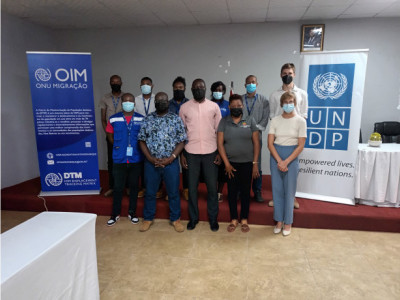Mainstreaming migration and development into the governance of local authorities in the Bicol Region
Related Sustainable Development Goals and Global Compact for Migration Objectives
Summary
This project comes from the JMDI Phase II, a UN Joint Migration and Development Initiative, run in cooperation by IOM, UNDP, ILO, UN Women, UNFPA, UNITAR which took place from 2012 to 2017 and worked to mainstream M&D issues into local development planning by raising the awareness of key Bicol local governments on the strategic value of M&D issues, developing the capacity of selected Bicol local government units (LGUs) to deal with M&D issues; establishing and institutionalizing local structures and mechanisms promoting M&D in the selected Bicol LGUs; and developing local projects and services for the overseas Filipino sector to improve the provision of social and economic services for overseas Filipinos.
The Bicol Region is among the regions with the highest proportion of overseas Filipinos (OFs). In 2007, Bicol region ranked 3rd among the poorest regions in the Philippines and the region is characterized by high incidence of poverty, an unequal distribution of income, and few employment opportunities. Also, the precarious economic situation in the urban centres is part of a social context of marginality and poverty that is one of the factors driving the flow of emigration from the region. Thus, the principal drivers of this emigration of Filipinos from Bicol are education of job-based. This context led local authorities to create various programmes attending the needs of their migrants and foster their interest in promoting and mainstreaming M&D issues at the local level.
Overall, the mainstreaming of migration and development into the governance of local authorities in the Bicol Region was achieved through the creation of the regional Committee on Migration and Development (CMD). Through awareness raising activities and training, the regional CMD was able to strengthen the capacity of selected Bicol local government units (LGUs) to deal with M&D issues. This led to the LGUs establishing and institutionalising their own local Committees on Migration and Development for enhanced coordination on migration and development. These were responsible for the strengthening or establishment of Migrant Resource Centres or Overseas Filipino Worker Desks that serve to orient and provide services for migrants and their families that help the municipality tap into their development potential.
Key objective
The main objectives of this project were to mainstream M&D issues into local development planning by raising the awareness of key Bicol local governments on the strategic value of M&D issues, developing the capacity of selected Bicol local government units (LGUs) to deal with M&D issues; establishing and institutionalizing local structures and mechanisms promoting M&D in the selected Bicol LGUs; and developing local projects and services for the overseas Filipino sector to improve the provision of social and economic services for overseas Filipinos.
Main activities
The key activities of this project involved MRCs set up to:
- Ensure safe and legal migration.
- Process timely and efficiently complaints and welfare concerns.
- Promote the socio-economic development potential of migration.
- Access to accurate and timely information.
- Serve as a venue for consultations and forums for migrants, their families and other stakeholders on important migration-related issues and concerns
- Provide psycho-social services (e.g. counselling, crises response, gender sensitivity training) and economic-related training and information.
- Assist the local government in developing and maintaining a database or profile of migrants and a registry of migrant associations abroad connected with the locality.
- Serve as a channel for diaspora philanthropy.
- Assist in the strengthening of overseas Filipino family associations through training and provision of office space.
Key successes or innovative factors, good practices and lessons learned (if available)
Good practices and lessons learned identified that:
- Trust between migrants and governmental entities leads to better development outcomes.
- Local and regional authorities play a pivotal role in the success of MRCs.
- A multi-stakeholder approach is necessary to best address migration and development linkages.
- A lead focal point to manage the MRC must be identified.
- Migrants and their families, both located within the Philippines and abroad, should be considered as partners.
Beneficiaries
The direct beneficiaries of this project were local government units within the Bicol region, migrants and their families, academia, CSO, the private sector, and the people's council while indirect beneficiaries identified were the six provincial governments, seven cities and three capital towns in the Bicol region.
